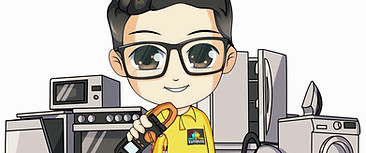Common Appliance Repair Solutions for Red Deer-Kumpuni Home Repair Services
- kumpuni2023
- Sep 22, 2025
- 3 min read
When household appliances break down, it can disrupt daily routines and cause unnecessary stress. Fortunately, many common appliance issues have straightforward repair solutions that can save you time and money. Whether it's a refrigerator that won't cool or a washing machine that won't spin, understanding these common problems and their fixes can help you decide when to call a professional or attempt a simple repair yourself.
Understanding Common Appliance Repair Solutions
Appliances are complex machines, but many problems stem from a few typical causes. Knowing these can help you troubleshoot effectively.
Refrigerator Not Cooling
A refrigerator that fails to cool properly is a frequent complaint. This issue can be caused by:
Dirty condenser coils: Dust and debris on the coils reduce cooling efficiency.
Faulty thermostat: If the thermostat is broken, the fridge may not maintain the correct temperature.
Defective compressor: The compressor circulates refrigerant; if it fails, cooling stops.
Solution: Start by cleaning the condenser coils located at the back or underneath the fridge. Use a vacuum or coil brush to remove dust. If the problem persists, test the thermostat with a multimeter or call a technician to inspect the compressor.
Washing Machine Won't Spin
A washing machine that refuses to spin can leave clothes soaking wet. Common causes include:
Broken drive belt: The belt connects the motor to the drum.
Lid switch failure: Many machines won’t spin if the lid switch is faulty.
Motor issues: The motor may be burned out or malfunctioning.
Solution: Check the drive belt for wear or breakage and replace if necessary. Test the lid switch with a multimeter and replace if defective. If the motor is the problem, professional repair is usually required.

Oven Not Heating
An oven that won’t heat can ruin meal plans. Possible reasons include:
Burnt-out heating element: The element may have visible damage or no continuity.
Faulty thermostat or temperature sensor: These regulate oven temperature.
Broken igniter (gas ovens): The igniter lights the gas burner.
Solution: Inspect the heating element for damage and replace if needed. Test the thermostat or sensor and replace if faulty. For gas ovens, check the igniter and replace if it does not glow.
Are Appliances Worth Repairing?
Deciding whether to repair or replace an appliance depends on several factors:
Age of the appliance: Older models may be less energy-efficient and more prone to breakdowns.
Cost of repair vs replacement: If repair costs exceed 50% of a new appliance’s price, replacement might be better.
Frequency of breakdowns: Frequent repairs indicate it may be time for a new appliance.
Environmental impact: Repairing extends the appliance’s life and reduces waste.
For example, a 10-year-old refrigerator with a broken compressor might be better replaced due to high repair costs and energy inefficiency. However, a washing machine with a simple belt issue is usually worth repairing.

Tips for Maintaining Appliances to Avoid Repairs
Preventive maintenance can extend the life of your appliances and reduce repair needs. Here are some practical tips:
Regular cleaning: Clean refrigerator coils, dryer vents, and oven interiors to improve efficiency.
Check seals and gaskets: Replace worn door seals on refrigerators and ovens to maintain temperature.
Avoid overloading: Don’t overload washing machines or dishwashers to prevent strain on motors.
Use appliances properly: Follow manufacturer instructions for use and care.
Schedule professional inspections: Annual check-ups can catch issues early.
By following these tips, you can minimize unexpected breakdowns and keep your appliances running smoothly.
When to Call a Professional for Appliance Repair
While some repairs are simple, others require specialized tools and expertise. Call a professional if:
The appliance is under warranty.
You suspect electrical or gas issues.
The repair involves complex parts like compressors or motors.
You are unsure about safety procedures.
For reliable and efficient service, consider contacting appliance repair red deer. Experienced technicians can diagnose and fix problems quickly, ensuring your appliances work like new.

Extending the Life of Your Appliances
Taking care of your appliances not only saves money but also reduces environmental impact. Simple habits like cleaning filters, avoiding harsh chemicals, and addressing minor issues promptly can make a big difference. Remember, timely repairs and regular maintenance are key to getting the most out of your household appliances.
By understanding common appliance problems and solutions, you can make informed decisions and keep your home running efficiently. Whether you choose to DIY minor fixes or hire a professional, knowing what to expect helps you manage appliance care with confidence.






